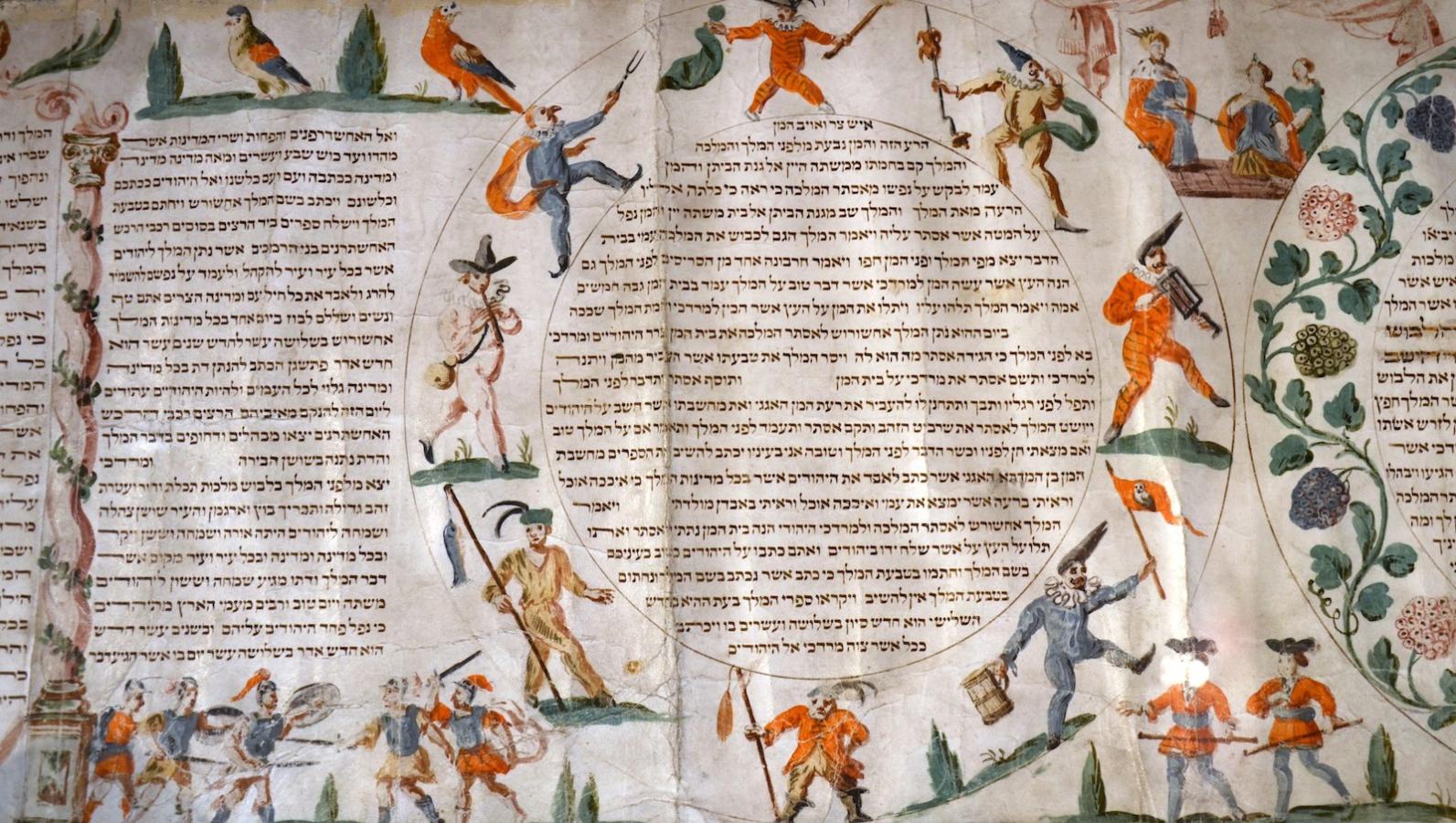THE PSEUDO-BIBLICAL BOOK OF ESTHER -- MAINSPRING OF ZIONISM
Every book in the Bible condemns the violent racism of modern Zionism… except one: the book of Esther. The source of the annual feast of Purim, Esther celebrates the Jews' slaughter of more than 75,000 Gentiles (which included women and children). No Biblical book has so influenced evangelical attitudes toward Israel, especially in approving Israel's brutality against Arabs. Esther thus plays a pivotal role for both Jews and Christians in their unconditional defense of the state of Israel.
For nearly 2,000 years, a minority of Christian scholars have been troubled by the book's omission of anything truly spiritual. Athanasius, some of the church fathers, and Martin Luther rejected it as apocryphal. The book never mentions God; nor do its protagonists, Esther and Mordecai. The Jewish people are delivered from annihilation yet never resort to prayer or thanking God afterward.
Instead, this book exalts and appeals to racist Jewish tribalism and appetite for revenge. It began the now familiar Zionist theme: long-suffering Jews as victims of irrational hatred from murderous Gentiles. It celebrates the triumph of Jews who obtain peace not by faith in God but by slaughter.
Ancient as it is, Esther’s message is current. It echoes the cries of Jewish protesters in Israel last month who shouted, “Kill Arabs! Kill those who want to destroy Israel! Kill them before they kill us! "
Is Esther a Jewish Fable?
The story begins with King Ahasuerus (possibly Xerxes) around 450 B.C. desiring a new wife to replace rebellious Queen Vashti. But the names of the book's hero and heroine, Mordecai and Esther, are derived from "Marduk" and "Ishtar," the head male and female deities of Babylon! This should sound alarm bells to Christians.
Why would supposedly pious Jews accept the names of the chief gods of Babylon, the moral cesspool of antiquity? Why is God’s name never mentioned, yet these names of Babylonian arch-deities are constantly honored?
At the time of its writing (perhaps 150 years after Jewish exile under Nebuchadnezzar) Jews were rapidly reflecting Babylonian/Persian culture. The Jewish Encyclopedia indicates that by that time lay teachers, the "Sopherim," forerunners of the scribes and Pharisees, were already absorbing the theology, customs, and superstitions of Babylon. Much of this would be included in the later Babylonian Talmud. At that time it was highly popular to name children after Marduk and Ishtar. In revealing that Jews were doing the same, Esther reflects an increasing Babylonian influence on Jewish theology and culture.
In chapter 3 the king promotes a Hitler persona, Haman, above all princes in his kingdom. Did this really happen? The meticulous chronicles of Persia record no such person or, for that matter, "Queen Esther" or Mordecai.
Haman hates the Jewish Mordecai and seeks to destroy all Jews. This is the classic Jewish stereotype: Gentiles inexplicably infected with the satanic "disease of anti-Semitism," compelled to destroy God’s chosen people.
The king, responding to a proposal made by Haman, thinks genocide of Jews in his kingdom is a good idea. Really? The record of the Persian kings was general respect for subdued peoples, not capricious annihilation.
Mordecai, hearing of the "Holocaust" to come, laments but does not cry to God. Instead, he utters a loud and bitter wail, not unlike the "Never forget!" litany of modern Judaism. Esther takes action but with no reference to the Almighty. Fasting is commanded, but without even lip service to the God who could give such deprivation meaning and power. (Fasting is not uniquely Biblical or intrinsically demonstrative of faith in God. Ezekiel, in fact, reveals that apostate Jewish women wept in mourning for Tammuz, goddess of Babylonia. Ezekiel 8:11) Mordecai counsels Esther with high-sounding but pseudo-scriptural admonitions (Esther 4:13-14).
The crisis ends when Haman, after attempting to hang Jewish Mordecai, is hung on his own gallows. It is discovered that Mordecai had once protected the king from assassination yet received no reward. Mordecai is exalted to the right hand of power in Persia. Now favorable to the Jews, the king authorizes the Jews to kill all of their enemies who are suspected of murderous intent. The book indicates that the king, having made the decree that the Jews should be killed, is bound under the laws of the Medes and Persians which says that imperial decrees cannot be revoked. Thus, he is forced to keep his original edict intact, while giving Jews the right to kill Gentiles first.
Actually, this is a phony dilemma. By granting Jews the right to kill Gentiles, he has already blatantly violated his own edict. If the story were true, it would have been a small thing for the king to let Gentiles in all of his far-flung provinces know that special blessing and protection were now given to the Jews, throwing a wet blanket on any persecution of them. Again, the general history of Persia reveals the extreme unlikelihood of the Esther narrative.
Yet the book asserts that on the day when the Jews should have been destroyed they attacked their enemies first, slaughtering more than 75,000. This is an act of war in a foreign land, a blatant violation of God's commandment to the Hebrews under Moses not to take war into foreign lands (Deut. 2).
The rationale of Esther is that if Jews suspect bias motivation against them that will endanger Jewish lives then it is their God-given right to take preemptive action and kill Gentiles first. This is exactly what the Talmud recommends, and it infuses the mentality of the IDF in Israel against Palestinians today. It is the basis on which the Anti-Defamation League of B'nai B'rith portrays Jews as perennial victims of hateful, anti-Semitic, even homicidal bias motivation on the part of Gentiles. Such paranoia deeply undergirds ADL's mentality that only hate crimes laws, outlawing such forbidden thoughts, can solve the problem of anti-Semitism.
Jewish revenge under Mordecai is the basis of the feast of Purim, celebrating both Jewish paranoia and vengeance. It is now the ethical standard for the Jewish right to revenge in Palestine. It also empowers Israel to violate the sovereign territory and air space of other nations in order to violently stop possible aggression against Israel. Doesn't Mordecai's program perfectly express Israel's demand that the U.S. and other nations join her in launching preemptive air strikes against Iran?
The book concludes with Mordecai exalted to power in Persia. It forgoes even a mention of God. Some have suggested that either Ezra or Nehemiah wrote the book of Esther. Yet in both the books named after them, these great prophets took every opportunity to supplicate, praise, and thank God—actions conspicuously and perversely absent from Esther.
Who Wrote Esther?

The Book of Esther has a violent ending.
Did Jesus, the Word of God who has inspired all other Scripture, inspire the book of Esther with its admonition to kill possible enemies before they kill you? Did Jesus inspire a book that glorifies Jews and omits all mention of the God of the Jews? Quite the contrary: Jesus deflated Jewish self-righteousness and racism. He admonished Jews to turn the other cheek to their Roman oppressors and warned that he who takes up the sword will die by the sword.
The Talmud says Esther was written by the "men of the great synagogue," the proto-Sanhedrin of 120 elders during the beginning of the intertestamental period following the last of the great Hebrew prophets. This is probably close to the truth. It casts great suspicion on the canonicity of the book.
Jesus said the tradition of the elders had made the law of God of none effect. (Matthew 15:1-8) Esther was a Babylonian import to Judea, and it is almost certain that the priests of Jerusalem, on the recommendation of Babylonian proto-Pharisees, enshrined it in the Hebrew canon.
There is one more powerful reason to believe this. The Dead Sea scrolls date back to between 150 and 70 BC and include the oldest known copies of the Old Testament. The Scrolls were preserved by the Essenes, who disapproved of the Pharisaic establishment in Jerusalem. This historic collection contains every book of the Old Testament exceptEsther.
Esther continues to bear evil fruit, right up to the latest news from Israel about Jewish settler violence against the Palestinians. Truly inspired Scriptures like Habakkuk, Malachi, and Zechariah—which existed just before the appearance of Esther—do not stimulate the persecution complex, self-righteousness or anti-Gentile violence that Esther does. Earlier, Jeremiah 29:4-9 strongly admonished Jews to dwell at peace and seek the welfare of the nations in their dispersion.
Who Decides What is Scripture?
In the final analysis, every believer has the right to decide whether a book of the Bible bears witness to divine inspiration. The Christian is not bound to mindlessly follow church councils in any age. Personally, the Holy Spirit forbids me to recommend Esther.
Some may object, saying, "Shouldn't we be generous and see the overall high-minded message in Esther?" If an expert is analyzing a possibly counterfeit $100 bill, he does not adopt a "positive" point of view. He gives tenacious attention to the ways the bill under suspicion does not live up to the genuine. Every Christian is obligated to similarly "try the spirits… for many false spirits are gone out into the world." (1 John 4:1)
Someone may also object that God would never allow His Bible to be contaminated. Well, He allowed His perfect creation in Eden to be so corrupted. Christ permitted one of His twelve disciples to be taken over by the devil. God does not want us to trust in anything above Himself, even in the Book He inspired. His Holy Spirit’s still small voice, “leading into all truth,” remains our ultimate authority. The Holy Spirit guided the remaining eleven disciples perfectly. He can also guide us in a world of counterfeit voices.
Rejecting Esther does not undermine the rest of the Bible. Holy Scripture (excepting Esther and perhaps the Song of Solomon, which was introduced during the same period) bears powerful witness of divine inspiration. Truly inspired Scripture is as impervious to attack as a Sherman tank before a BB gun.
In conclusion, do Christians have the right to include a book in the Bible which does not mention God's name, offers no prayer or thanks, and exalts Jewish heroes and the Jewish people while demonizing Gentiles? Esther does not emphasize that we are saved by abiding in God through faith. Instead, it says Jews are saved by being suspicious of the motives of others, even killing them en masse.
I am not in danger of heresy by excluding Esther from the Bible. Those most in danger are those evangelicals in our time who stand on this book to sanction the most despicable atrocities by Israel against the Palestinians. (See, Israel: Founded on Terror)
Editor's note: For a much fuller discussion of this issue, listen to our latest Bible Study, 4-5-11 "Esther, the book that shouldn't be in the Bible", at TruthTellers.org.

Ted, today - photo: John Pike, October 2019
Mail: P.O. Box 828, Clackamas, OR 97015
Email: Rev. Ted Pike
Breaking News
Hate crimes laws may make you a lawbreaker! Such laws, while claiming to promote tolerance, actually lead to the end of free speech! Powerful articles and NPN’s video exposé of hate crimes laws in Canada and the United States provide you with the vital tools necessary to combat this imminent threat to freedom. This video is especially important as acts of terrorism extend the power of "Big Brother" to monitor what you do, say, and think.

4 Jul 2020 - EMERGENCY ALERT
White House sources have revealed that President Trump regrets following the left-conciliating advice of his son-in-law and senior advisor, Jared Kushner regarding police reform.
They say he has abandoned Kushner’s advice on this issue, returning to his previous assertion that “systemic racism” in American police is a virtual non-issue compared to the magnitude of protection and fair play which the vast majority of police provide all citizens.
More…
17 December, 2019 - EMERGENCY ALERT - Trump Supports Jewish Claim: Christianity is Antisemitic.
President Trump’s recent Executive Order IS THE TEXT of the Jewish ADL’s “Anti-Semitism Awareness Act, S852, recently rejected by the US Senate for Committee consideration.
More…
24 Sep 2019 - EMERGENCY ALERT
“Anti-Semitism Awareness” Bill Worse than “Equality” Bill! Good news! The Christian-threatening, LGBT- promoting “Equality Act” could not face confrontation with hostile Senate Judiciary Republicans this spring. It went nowhere. Yet Democrats could still try to get it through the Senate Judiciary. NPN will sound the alarm at Truthtellers.org if it starts to move forward.
18 May 2019 - EMERGENCY ALERT - Senate New Forum for “Equality” Bill Debate
Call the Congress Hotline at 1-202-224-3121 and ask for a Senator’s office. I suggest you say: “Please don’t vote for the “Equality Act” S788. It will help end free speech for Christians making them criminals if they criticize Homosexuality”.
More…
01 May 2019 - EMERGENCY ALERT - “Equality” Bill Hastens Babylon the Great - Part Two
If Jews acquire full protection as a “protected class” in America it will mean that if a Jew complains to the government that he has suffered “acute emotional trauma” as a result of “anti semitic” discrimination or criticism of his race or religion he may prompt a federal investigation. If the government agrees, the defendant will have to retain the best lawyer he can find.
More…
Contact Truthtellers
Mail: P.O. Box 828, Clackamas, OR 97015
Email: Rev. Ted Pike, npntedpike [@] gmail.com
Social Media
